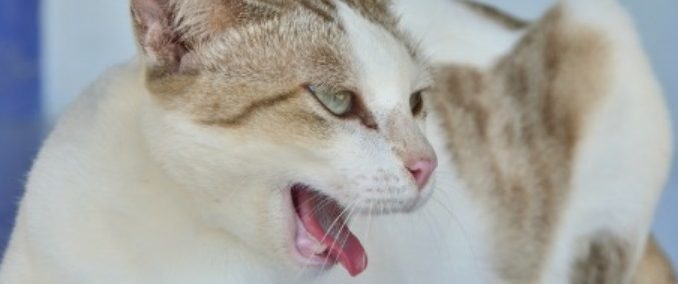
Like many pets, cats are able to feel when you are sad or ill. But what about US being able to tell when THEY are unwell? Far too often, people realise their cat or kitten is sick when it is already too late. This is why we’d like to share with you some common signs showing that your cat needs a ride to the vet. Some symptoms are easy to check, other are more specific. If you pay attention to little details, you might grant your cat a many more years to live!
Is Your Cat’s Attitude different?
The first thing that makes it difficult to know when a cat is sick is that, like humans, they are all different. We could say that a cat in pain meows more than usual, but if your kitten meows naturally a lot, it would not help you so much. The same way, a cat unwell may be more quiet than usual, but if your little friend is calm by nature, how would you tell the difference? So the best thing to do is to compare its attitude to its usual behaviour. Any important changes might be a sign of unwell-being.
Here, we need to differentiate two types of health problems.
Pain and Wounds
If your cat has been bitten and the wound start to get infected, or if he broke a bone, he generally won’t be acting as usual. He won’t show it, but if you stroke him on the wound, he will probably meow bitterly or even get aggressive and try to scratch or bite. If you spot that your cat is over-grooming or licking one spot more often, it is most likely that he is wounded at that spot.
Illness and Sickness
On the other hand, if your cat is affected by a more serious illness, it is often more difficult to tell. Here are signs that you need to look for:
- Excessive and unusual meows or other sounds: this could be sign that something is disturbing him, like excessive hunger (happens when they have worms for example), stomach troubles, fleas, etc.
- Weird sitting position: study the position in question. Hunched could mean stomach trouble, leaning could mean a wound that stops him from sitting straight, never sitting could mean worms, etc.
- Restlessness or feeling anger towards surroundings: this could be a symptom of fever, which often happens when a wound get infected. To tell is your cat has fever, you can try to feel its nose, but the only accurate method is to use a rectal thermometer (be careful, they do not like it and if it’s already angry, it might be a tricky step).
- Uninterested in anything and neglecting to groom himself: this is a very worrying sign. A cat neglecting himself is often sign that he can feel the end coming.
- Purring incessantly: if purring incessantly while he’s does not usually, your cat might also be trying to make the most of its last moments with you. This is something to watch closely.
- Hiding: if your cat is hiding, you should definitely worry as well. When cats feel they are going to die, they often hide somewhere to leave quietly.
But again, some of these symptoms might just be part of your cat’s common attitude. You should start to worry mainly if these signs are not regular.
Does Your Cat Have a Good Appetite?
This is an easy symptom to spot: if your cat doesn’t eat as usual, or if he seems to have lost weight, it is most likely that either he feels nauseous (probably meaning stomach troubles) or that he has a pain or a discomfort so important that it makes him lose its interest in food. In case of stomach problem, you can try to feel his stomach: if it feels hard, it is most likely that you are right believing he has stomach troubles.
On the other hand, if he starts to eat more than normally, this could mean that he has thyroid glands problems or worms. Excessive thirst might also mean something bad, such as a kidney disease, diabetes or infections.
Does He Have a Bad Breath?
Well, there is bad breath and BAD breath. Obviously, cats won’t have a minty fresh breath, rather a cat food breath, which is acceptable. But if its mouth starts to smell something fishy, it could translate gastric problems.
Is He Looking For More or Less Attention Than Usual?
As we said, a cat trying to hide might be a sign that he’s near the end. But the opposite – a cat looking for more attention than usual – may also transcribe that he experience a discomfort. Behavioural changes are more difficult to spot by cats, but they are also more revealing. If you have doubts, pay extra attention to these signs in order to feel at best what your cat is feeling himself.
Did You Notice a Change in Its Toilet Habits?
This is another easy symptom to check: if your cat is pooping or urinating more or less than usual, or if its business is smellier or shows an uncommon texture, there is definitely a problem with your cat’s health. If you spot diarrhoea, pay attention to other signs of unwell-being: if there is none, it might just be because of what he ate before, in which case you can just give him plenty of water and wait for a day. If the symptoms persist, then go to the vet to have him checked for stomach problems.
… Or in Its Sleeping Pattern?
When in pain or unwell, it seems obvious that anyone would struggle to sleep well, even cats. If your little friend is restless and meowing at night, it probably means that there is something wrong with him. In return, if it sleeps more than usual, it could mean he didn’t manage to sleep at night because of something bad as well. The best moment to check for this symptom is when calling him for food. If he doesn’t bother, you should probably worry, unless he never does; as we said, all these signs turn into symptoms when they are not regular.
Is Your Cat Mouth Breathing?
This is a very obvious sign, and also a very bad one. Mouth breathing shows that your cat doesn’t get enough oxygen. It can come from a respiratory problem or a heart disease.
It often happens when cats get FIV (cats AIDS). This disease stops the body from creating new red blood cells which are responsible for transmitting oxygen from the lungs to the rest of the body. It often comes with a very pale tongue (because not irrigated enough) and a very weak behaviour. If all these signs are showing, you may take him to the vet, but you should know that it is probably too late. FIV is a common disease by cats who can access outside and meet other cats. Like AIDS, it can be dormant during many years and start affecting the cat only years later. There is unfortunately not much you can do when the disease starts to spread.
Now, if you pay some extra attention to all these little signs, you will be more capable to tell if your cat is really sick. Just spend time with him, feel him, like he does when you are unwell. Be confident in the fact that human and animals can connect and you will know for sure if there is something wrong with your little friend, in which case the help of a professional vet will be necessary. Also, when going to the vet, talk to him, chat with him, try to understand why the disease and how to treat your sick cat accordingly. This will help you to get closer to your pet and understand him at best.

Leave a Reply